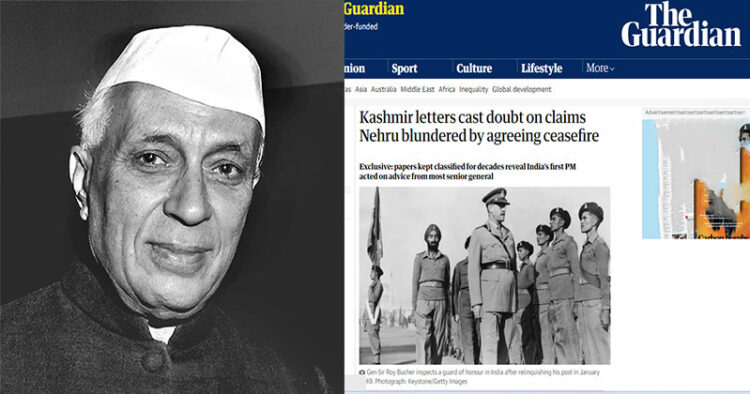This refers to the article titled – “Kashmir letters cast doubt on claims Nehru blundered by agreeing ceasefire” in The Guardian
“The first qualification of a soldier is fortitude under fatigue and privation. Courage is only the second; hardship, poverty, and want are the best school for a soldier.” – Napoleon Bonaparte
The alleged claim of passing the buck from India’s first Prime Minister to British residual senior General Sir Roy Butcher is sure to backfire as it opens up a whole unwanted and unintended (!) box of worms.
The crux of the article can be summed up as –
As the then General of Army Gen Sir Francis Robert Roy Bucher cautioned PM Shri Jawaharlalji Nehru against continuing the war with a reasoning of fatigue- mental and physical of the forces under him, the then PM acted on his advice and took steps that have put the region in a quagmire for more than seven decades. Ceasefire with Pakistan, whose Army was part of the Undivided Indian Army till just a few months ago was surprisingly full of josh and battle ready compared to its Indian counterpart in 1948 certainly looks like a trap by the British rulers who were hell-bent upon thrusting vivisection to the Indian National Congress in general, and the then Prime Minister in particular.
The article goes on to justify the “blunder” was not ill-informed as alleged by BJP at the time of revocation of Article 370 in 2019, but a well thought decision on the advice of a General.
The shifting of onus from Shri Jawaharlal Nehru–, the blue-eyed-boy of “vivisection-on-my-dead-body” Mahatma Gandhi to the British General does not absolve him of the phenomenal blunder but shows him as a leader who does not have his own opinion or assessment of the situation and verification of facts from other sources.
In any case, the tone and tenor of the article results in painting Nehru ji as a pusillanimous and over dependent on the advice of the General. He could and should have had called the legendary Field Marshal Cariappa (General at the time) at least for a customary second opinion.
The chronology of events clearly points out the fact that in the field of experience and visionary course of events, the son-of-soil FM was way above the British General. The Kashmir we see today as Indian Kashmir is the result of Cariappa’s field battles around Srinagar and daringly defied orders for a ceasefire from the Government.
… He launched three subsequent attacks—Operations Kipper, Easy and Bison—to capture the Naushera, Jhangar, Poonch, Zoji La, Dras, and Kargil areas. Plans were laid to drive out the Pakistani forces from Kashmir completely, but they were stopped by the intervention of the United States. On 6 July 1948, the Army HQ issued strict instructions against conducting any major operations without its permission. Cariappa protested against this, stating that this policy would threaten Leh, Kargil, and ultimately the Kashmir Valley, which would put the country’s security at stake. Though Cariappa asked for two brigades to continue offensive strikes, he was provided only one and permitted to advance to Kargil. He disobeyed orders and launched strikes in the Ladakh area allowing India to assert control over the region. Cariappa continued several operations and offensive strikes against the Pakistanis which involved high risk. Failure of any of them might have threatened the Indian forces. He was subsequently appointed to the supreme post of commander-in-chief…
Geneal (then) Cariappa was kept out of loop for major part of the period and only when the things in Kashmir turned worse from bad, he was called to literally firefight the field situation.
Nehru ji in his characteristic obsession for British superiority not only heeded to the ill-gotten advice for ceasefire from the British General but made the whole affair extremely complicated by inserting the now defunct Article 370 later. It is to be noted here that none other than Bharatratna Dr Babasaheb Ambedkar warned him about the perils of the unilateral decision.
So, if the present Government is trying not to de-classify the archives, then it is actually doing a great service by covering the weakness in character of a leader who was supposed to be a legend in his lifetime, rather than using a lame excuse to abrogate the infamous Article which was akin to a millstone around neck of our motherland for next seven decades.
The Guardian, in its usual style of painting the present Government in poor light has actually opened a wholly new and not-so-likable trait of a hitherto great leader and longest serving Prime Minister of independent India.
The events of Chinese aggression followed in the early sixties vouch for the fact that the first Prime Minister of India was bereft of vision for international relations and took his dream-turned-nightmare till he got a Himalayan jolt.



















Comments